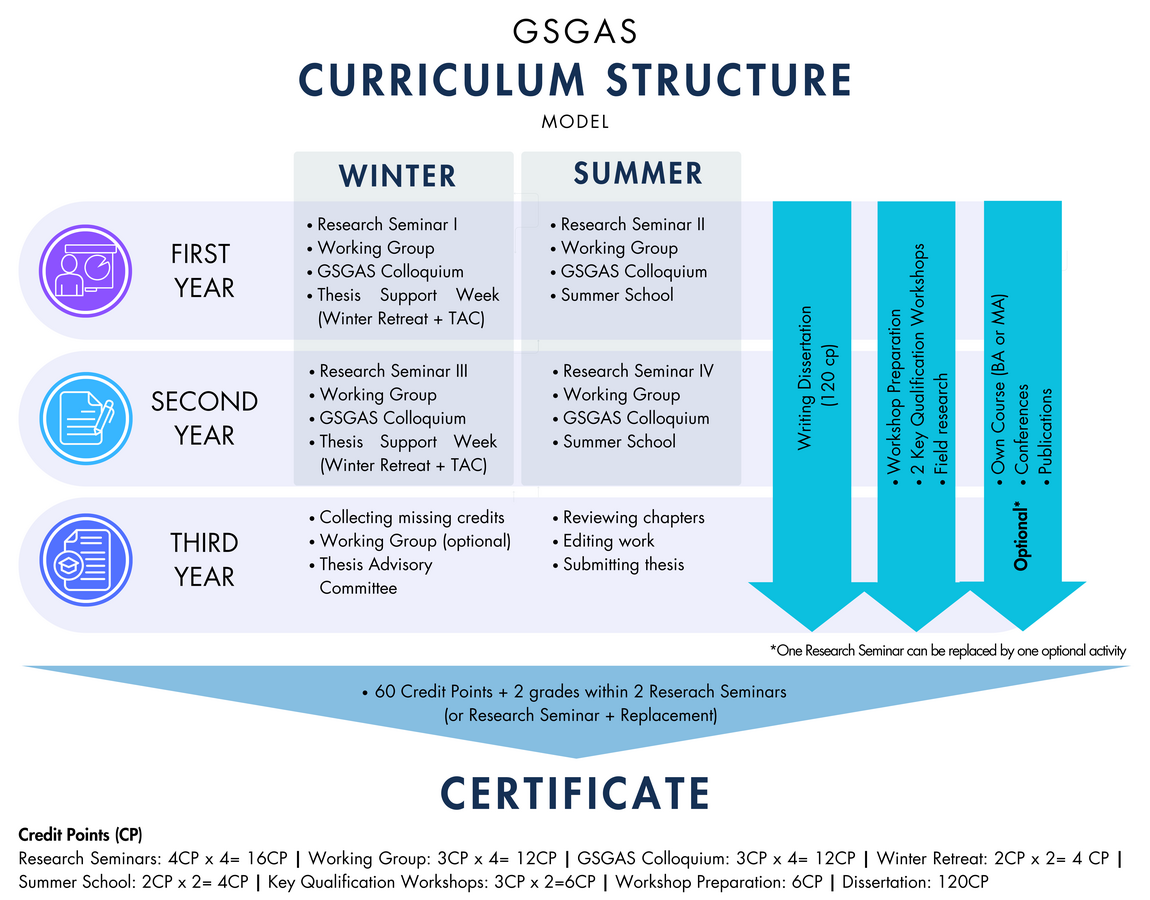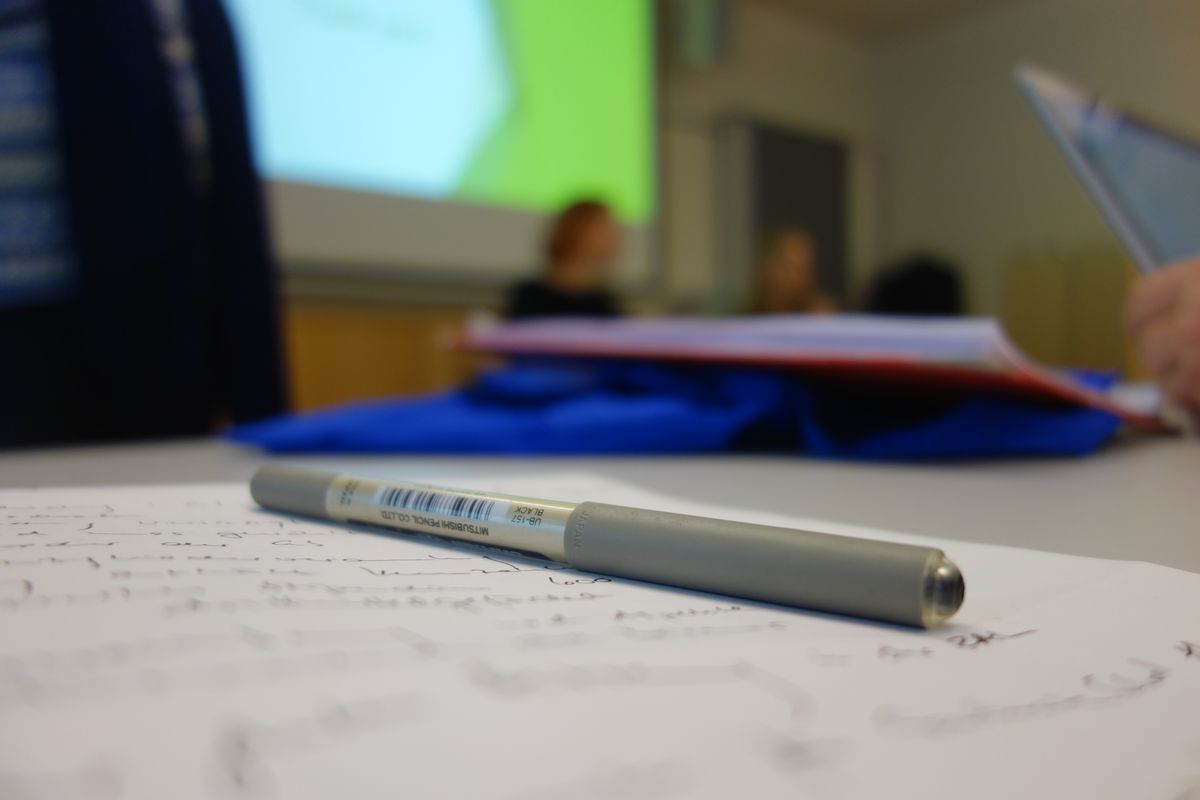The Graduate School is characterised by its content-related teaching programme, which includes interdisciplinary research seminars, colloquia, summer schools and winter retreats as well as working groups. The research seminars combine key areas of interdisciplinary research at ReCentGlobe with corresponding theoretical and methodological training from all participating disciplines.
Curriculum
The curriculum forms a synthesis of North American graduate training and European PhD culture by offering doctoral research seminars on borderline and overlapping areas of the participating subjects as well as a set of methods courses that introduce the handling of new interdisciplinary procedures. In addition, there are summer and winter schools in which the doctoral students form their interdisciplinary constellations on their own responsibility by forming panels with fellow students from the GSGAS or invited peers from outside. The close integration of these courses with the theoretical and methodological discussion of the ReCentGlobe proves to be extremely fruitful in both directions, as many suggestions for the research areas within the ReCentGlobe arise from the debates with the junior researchers.
The basic components of the curriculum are four research seminars, four doctoral colloquia, four working groups, two summer schools and two winter retreats over the course of the three-year (i.e. six-semester) structured doctoral programme. Each of these components has a specific didactic concern.
The programme can be completed in six semesters and is concluded with the achievement of 180 cp and two graded achievements. Graduates receive a certificate that is recognised as a Rigorosum (regulation in the respective doctoral regulations) as well as a transcript of records documenting the courses attended and the graded achievements.
The PhD programme is calculated according to the ECTS model. The six-semester qualification programme is based on 180 credit points (cp), whereby
- 120 cp are allocated to work on the doctoral thesis and related opportunities for discussion of interim results, and
- 60 cp for teaching formats accompanying the doctorate, which aim to impart methodological, subject-specific and interdisciplinary competence (here: formats accompanying the doctorate and parts directly related to the doctoral project)
can be credited.
To apply for the certificate and the Transcript of Records, please submit the study book and the completed form to the coordinator.
The supervision of PhD candidates at GSGAS follows high standards, which includes mentoring and regular meetings with the Thesis Advisory Committee (TAC) in addition to direct supervision. In the six disciplinary or thematically organised TACs, the PhD candidates regularly report on their work progress within the framework of the Thesis Support Week.
- Eastern Europe in a global context (Martin Bauch, Katja Castryck-Naumann, Julia Herzberg, Maren Röger)
- International Studies (Ulf Engel, Jens Herpolsheimer, Megan Maruschke)
- Transnational and Area Studies (Elisabeth Kaske, Dmitri van der Bersselaar, Steffi Marung)
- Cultural Studies/Comparative Social and Cultural History (Maren Möhring, Dirk Quadflieg, Antje Dietze, Nina Mackert)
- Social Cohesion (Markus Dreßler, Gert Pickel, Alexander Yendell)
- Geographies (Judith Miggelbrink)
SUPPORT
In addition to the teaching programme and excellent supervision, the Graduate School offers its members a range of support services, including travel grants, work spaces and language courses.
The Graduate School provides funds to support research stays abroad and conference attendance with an own contribution by PhD candidates of the Graduate School.
A complete application for travel grants includes the following documents:
- Informal confirmation and consent of the supervisor(s)
- the completed application form with details of:
- explanation of the purpose of the travel
- abstract of the conference paper, if applicable
- official invitation to the conference or the conference programme
- explanation of expected travel costs
Applications for travel grants should be submitted to the Graduate School Coordinator at least 6 weeks before the event.
After a positive decision by the Executive Board, a travel application (including Annex 1) and, after the trip, the explense claim with all original receipts and original signatures will be submitted.
GSGAS offers a limited number of work spaces for PhD candidates. The available workplaces are located at Emil-Fuchs-Straße 1. The workplaces are usually equipped with computer, printer and telephone connections. Please send informal applications for a work space to the coordinator of the Graduate School.
Although knowledge of German is not a prerequisite for admission to the programme, the Graduate School supports PhD candidates from abroad in acquiring language skills by offering German courses for different levels. Registration for the language courses is possible until the beginning of the semester (1 October for the winter semester, 1 April for the summer semester).
A placement test is held at the beginning of the winter semester. Participation in the courses is free of charge for PhD candidates of the Graduate School
GSGAS encourages PhD students to plan and conduct their own workshops and offers logistical support and financial funding. Applications stating the exact topic and the reasons for integrating the research interest into the thematic priorities of the Graduate School as well as a list of speakers and their respective topics with a timetable and cost estimate can be submitted to the Graduate School coordinator.
The decision of the Executive Board of the Graduate School is made according to the available financial resources.

